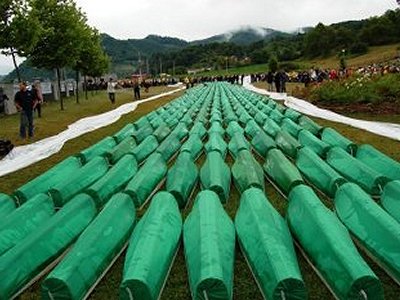
REMEMBERING SREBRENICA
Hitler knew that forgetting history helped the cause of cruelty, which is reason to remember a Balkan atrocity
Among the centenary commemorations surrounding the First World War, one has been largely overlooked in the UK: the fate of the Armenians. Elsewhere, it has provoked furious debate and disagreement.
Many Armenians hoped the Allies would win the war so they could establish their own nations from the shattered Ottoman Empire. After an uprising, the response of the Turks was vicious. Constantinople’s Armenian leadership was decapitated on April 24, 1915 and there followed the brutal murder of Armenian males and the subjection of women, children and older people to a series of hopeless death marches, deprived of food and water. Estimates vary over how many were killed, but is presumed to be somewhere between 0.6 and 1.5 million. The latter figure constitutes 90% of the Armenian population of the time.
By most accounts this comprises genocide, but the modern state of Turkey has adamantly refused to recognise it. The Turks had identified Anatolia as their own new homeland and systematically drove out the Armenians to achieve this. In other words, the slaughter of the Armenians is part of the foundation story of modern Turkey and it remains an inconvenient truth. Turkey’s way of dealing with this has been to argue that World War One provoked many traumas, including large military losses among the Turks, and that Armenian suffering was only one component of the picture.
Recently Pope Francis called these events ‘the first genocide of the twentieth century’, provoking a hostile response from Turkish president, Recep Erdogan, who warned him not to re-iterate this.
In ancient Israel, the nation was told to remember the traumas and the victories of its past, to ensure the people remembered their sins and God’s salvation. Nations effortlessly recall their proudest moments but find it especially hard to make an honest account of collective sin and failure. This is evident in the way every nation memorialises its past.
In July 2015 it is twenty years since the massacre of more than eight thousand Bosnian Muslim males in Srebrenica by Serbian paramilitary units under the command of Ratko Mladic. The indigenous people were left with a buffer of a few hundred Dutch UN troops after these units overran a UN designated safe area but UN assurances came to nothing after their forces, having retreated to barracks, essentially left the local people to a fate which could have been predicted given the course of the Balkan war.
In the years following this, there was great recrimination. The failure in Srebrenica led to new iterations of humanitarian intervention, spelled out by Tony Blair in his Chicago speech and the UN’s subsequent Responsibility to Protect (R2P) doctrine. An assertive Allied military response to the deepening violence in Kosovo later that decade – though heavily criticised by many commentators in the west – spared many people a similar fate to the Bosnian Muslims.
The invasion of Iraq and the intervention in Libya in the early years of this century, having made distressing situations even worse, probably means the short era of humanitarian military intervention has come to an end. There is a paradox in using force to promote peace in other parts of the world and the risks of unintended consequences have been tragically borne out recently in North Africa and the Middle East. However, the issue of whether and how to prevent genocide and slaughter when it is in the capacity of others to do this will continue to probe consciences.
Adolf Hitler’s words: ‘who, after all, still speaks today of the extermination of the Armenians?’ remind us of the consequences of forgetting genocide. The 2015 UK General Election was notable for the absence of foreign policy debate; meanwhile Syria and Libya burn. More than ten thousand people were driven from their homes every day in 2014 by war and violence in the Middle East and North Africa; the total number of refugees worldwide is at its highest ever level: 38 million. A distinctive feature of Christian citizenship today lies in prayer for these people and the memorialisation of past traumas. We will speak today of the extermination of the Bosnian Muslims.
POPULAR ARTICLES

Obama's Covert Wars
The use of drones is going to change warfare out of all recognition in the next decades.

Through A Glass Starkly
Images of traumatic incidents caught on mobile phone can be put to remarkable effect.

What Are British Values?
Is there a British identity and if so, what has shaped the values and institutions that form it?


